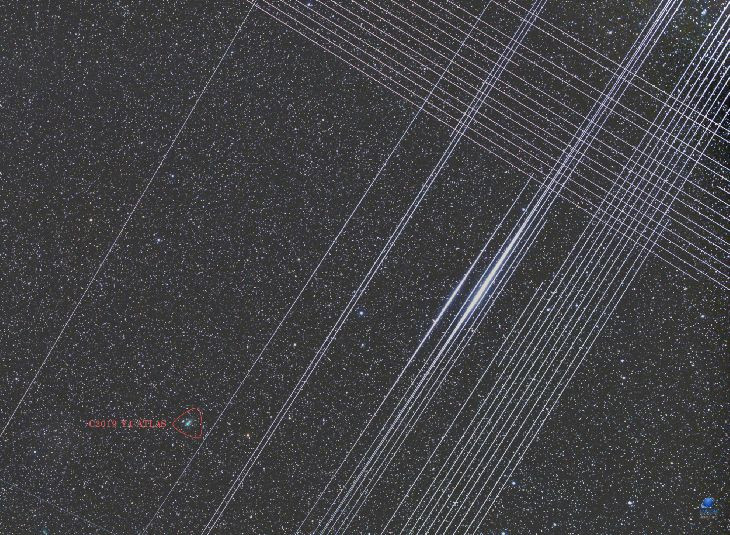Trains Of SpaceX’s Starlink Satellites Ruin Photo Of Comet Atlas

KEY POINTS
- Starlink satellites appeared in a photo of the comet Atlas
- The satellites appeared as grid-like light streaks
- SpaceX's satellites can affect astronomical observations
An amateur astronomer trying to take a photo of the fragmenting comet ATLAS accidentally came across trains of Starlink satellites deployed by SpaceX. The astronomer’s experience is the latest case of the satellites ruining astronomical observations.
Atlas is a recently discovered comet that’s currently on its way to approach the Sun. Observations on the comet revealed that it has started to break apart.
Zdenek Bardon, an amateur astronomer from the Czech Republic, was watching the comet on Sunday (April 19). He was trying to take clear photos of the comet using his Nikon D810A camera. Although he was able to capture a photo of Atlas, it was ruined by the sudden appearance of SpaceX’s Starlink satellites.
As noted by Bardon, the light streaks caused by at least two trains of Starlink satellites appeared in his photo. These streaks appeared in a grid-like pattern around the comet.
“I was trying to photograph disintegrating Comet ATLAS,” he said, according to SpaceWeather.com. “My local night sky suffers from light pollution, and stacking of multiple exposures is necessary in order to image the comet. Unfortunately, I had not considered the trajectories of the Starlink satellites, and many of my exposures were contaminated.”
Bardon’s experience is the latest incident of Starlink satellites accidentally appearing in photos of cosmic objects. Many of these incidents were documented by SpaceWeather.com through an image gallery that specifically shows photos of Starlink satellites photobombing astronomical observations.
Currently, there are over 360 Starlink satellites orbiting Earth. For the project, SpaceX plans to launch over 40,000 satellites to provide high-speed internet connection from space. Due to the number of satellites that the company aims to launch, astronomers warned that the presence of the Starlink units would disrupt the operations of observatories.
In line with this matter, the International Astronomical Union released a statement to explain how the Starlink project would affect the field of astronomy.
“Apart from their naked-eye visibility, it is estimated that the trails of the constellation satellites will be bright enough to saturate modern detectors on large telescopes,” the organization stated. “Wide-field scientific astronomical observations will therefore be severely affected.”
© Copyright IBTimes 2025. All rights reserved.





















